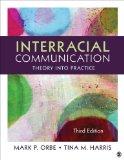Family reunification & resistance
FOUND
Get over your denial
Interracial Communication book available now!

I am pleased to report that the third edition of the book Interracial Communication: Theory Into Practice has been published, and that it contains a short version of my Checklist for Allies Against Racism.
I developed the checklist many years ago (in the 1990s) when I was part of an interracial coalition working to implement multicultural education in the Ithaca, New York public schools. As I observed well-intentioned liberal and progressive allies struggling to hear and understand the anger and frustration of concerned parents and teachers of color at organizing meetings, it occurred to me that white privilege was sometimes getting in the way of genuine dialogue.
That is, our white allies and would-be supporters were often unable to “get” our perspective as people of color. It made it difficult to believe that we were fighting for the same thing. It was challenging for us as parents and teachers of color to hang in there and trust that we would be heard. So, in an effort to be helpful and move the conversation forward, I came up with a list of concrete behaviors that, when I saw white folk doing them, helped me to determine that they actually DID understand racism and what people of color were feeling and saying.
The list can be read as a hopeful one, in that it reflects my view that there ARE (some) white people who understand us, and who can be depended on in the struggle against racism. In other words, the list reflects things that allies do regularly to signal that they “get” it and have our backs.
In a nutshell, true allies share power. Allies believe in us. Allies treat us as equals. Allies are not afraid of us. Allies see us as human, like themselves. Sounds simple enough, right? But it’s a lot harder to pull off in practice. Sadly, it is not easy to find people living by those values and practices on a day to day basis.
I find it interesting–not to mention a little depressing–that more than 20 years later, the list is still needed. I get requests all the time from individual activists, anti-racism trainers, professors, teachers, and diversity consultants who want to use the checklist in a workshop or class on race. All those requests suggest to me that we are NOT living in a post-racial utopia, and that we still have much work to do to promote social justice in our society. I am glad that people find the checklist useful, don’t get me wrong. At the same time, it makes me sad that we still need to convince large numbers of oblivious people to wake up and start understanding their roles as allies.
If you want to see the full Checklist for Allies Against Racism (it’s a lot longer than the abridged version in the book), you can download it for free here. Since it is a copyrighted document, I ask that you request my permission if you decide to use it in a class or publication.